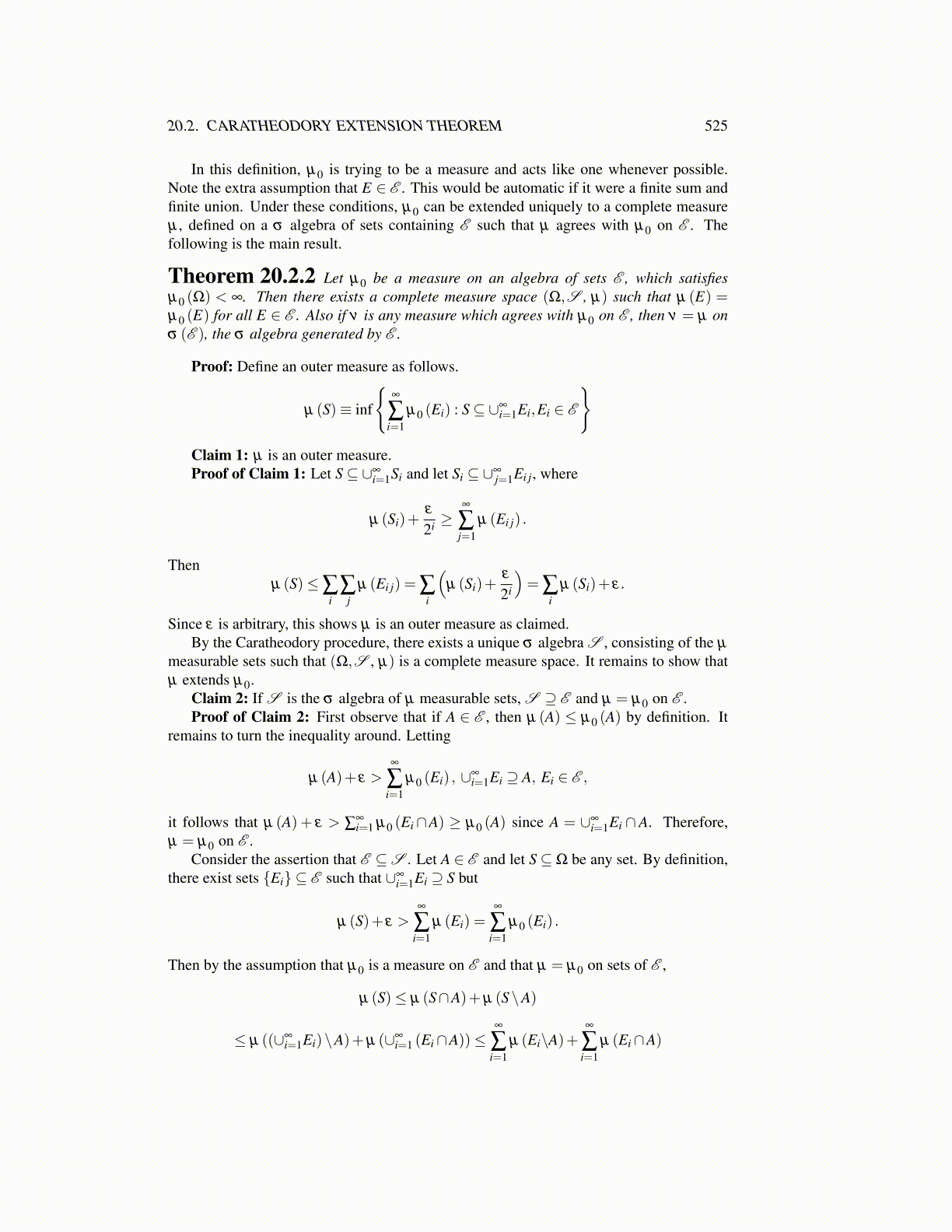
20.2. CARATHEODORY EXTENSION THEOREM 525
In this definition, µ0 is trying to be a measure and acts like one whenever possible.Note the extra assumption that E ∈ E . This would be automatic if it were a finite sum andfinite union. Under these conditions, µ0 can be extended uniquely to a complete measureµ , defined on a σ algebra of sets containing E such that µ agrees with µ0 on E . Thefollowing is the main result.
Theorem 20.2.2 Let µ0 be a measure on an algebra of sets E , which satisfiesµ0 (Ω) < ∞. Then there exists a complete measure space (Ω,S , µ) such that µ (E) =µ0 (E) for all E ∈ E . Also if ν is any measure which agrees with µ0 on E , then ν = µ onσ (E ), the σ algebra generated by E .
Proof: Define an outer measure as follows.
µ (S)≡ inf
{∞
∑i=1
µ0 (Ei) : S⊆ ∪∞i=1Ei,Ei ∈ E
}Claim 1: µ is an outer measure.Proof of Claim 1: Let S⊆ ∪∞
i=1Si and let Si ⊆ ∪∞j=1Ei j, where
µ (Si)+ε
2i ≥∞
∑j=1
µ (Ei j) .
Thenµ (S)≤∑
i∑
jµ (Ei j) = ∑
i
(µ (Si)+
ε
2i
)= ∑
iµ (Si)+ ε.
Since ε is arbitrary, this shows µ is an outer measure as claimed.By the Caratheodory procedure, there exists a unique σ algebra S , consisting of the µ
measurable sets such that (Ω,S , µ) is a complete measure space. It remains to show thatµ extends µ0.
Claim 2: If S is the σ algebra of µ measurable sets, S ⊇ E and µ = µ0 on E .Proof of Claim 2: First observe that if A ∈ E , then µ (A) ≤ µ0 (A) by definition. It
remains to turn the inequality around. Letting
µ (A)+ ε >∞
∑i=1
µ0 (Ei) , ∪∞i=1Ei ⊇ A, Ei ∈ E ,
it follows that µ (A) + ε > ∑∞i=1 µ0 (Ei∩A) ≥ µ0 (A) since A = ∪∞
i=1Ei ∩ A. Therefore,µ = µ0 on E .
Consider the assertion that E ⊆S . Let A ∈ E and let S ⊆Ω be any set. By definition,there exist sets {Ei} ⊆ E such that ∪∞
i=1Ei ⊇ S but
µ (S)+ ε >∞
∑i=1
µ (Ei) =∞
∑i=1
µ0 (Ei) .
Then by the assumption that µ0 is a measure on E and that µ = µ0 on sets of E ,
µ (S)≤ µ (S∩A)+µ (S\A)
≤ µ ((∪∞i=1Ei)\A)+µ (∪∞
i=1 (Ei∩A))≤∞
∑i=1
µ (Ei\A)+∞
∑i=1
µ (Ei∩A)